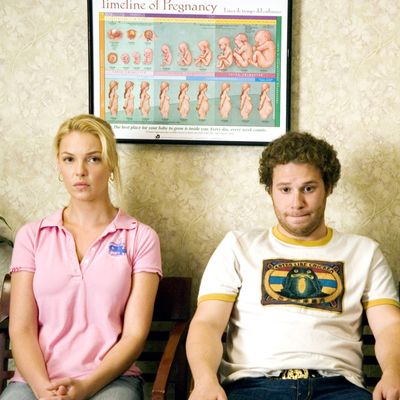
In 2008, Katherine Heigl committed the unforgivable offense of describing the film Knocked Up as “a little sexist” in a Vanity Fair interview. The backlash was swift and decisive, with Heigl gaining a reputation for being ungrateful and difficult that would go on to tank her career. It also kicked off a long-standing hostility between Heigl and her co-star Seth Rogen (he described the remarks as “batshit crazy” and quipped sarcastically that her movie The Ugly Truth “looks like it really puts women on a pedestal in a beautiful way”).
Heigl recently apologized for the remarks — which she made eight years ago — and now Seth Rogen has gracefully decided to absolve her of her sins. Well, sort of.
“I respect the fact that maybe, that perhaps she realizes it has hurt her career,” Rogen told Howard Stern yesterday. “And I don’t want that to have happened to her at all. Because I’ve said a thousand stupid things, and I really like her. Especially if she is being honest, the only people who, in this situation, should in any way take anything from it is me and Judd. Because we are the ones she was talking about. For other people to not work with her because she didn’t like her experience with us is crazy.”
Still, Rogen said that, “as someone who’s an egomaniac, I just get hurt by that” and that Heigl’s remarks made “[his] trust feel somewhat betrayed.” And, yes, he’s still waiting for a personal apology: “When I apologize to people, generally I don’t take a public forum to do it.”
Frankly, the fact that Heigl is still being dragged for criticizing Knocked Up is kind of astounding. First off, the film is a little sexist, and Heigl’s assessment — that the film “paints the women as shrews, as humorless and uptight, and it paints the men as lovable, goofy, fun-loving guys” — feels pretty spot-on. The fact that a woman’s career disintegrated after she accurately pointed out an example of Hollywood sexism, just a few years before gender discrimination became a major industry talking point, seems like the real crime here — not hurting Seth Rogen’s feelings. Plus, Heigl has since acknowledged that her remarks were taken out of context, taking some responsibility for the character’s direction (“Judd allows everyone to be really free and improvise and whatever,” she told Stern. “Afterward, I was like, ‘Why is that where I went with this?’”). It’s hard to read her remarks as a criticism of Rogen in any way, especially given that Rogen didn’t write or direct the film. Man, he seems really sensitive. Maybe he’s on his period?
As for the films Seth Rogen did write or direct? Well, there was Superbad, which Rogen now acknowledges was “blatantly homophobic,” and The Interview, which nearly started a major geopolitical catastrophe (that one was a little homophobic, too). And yet Rogen’s record in Hollywood is basically pristine. We see this double standard time and time again. Robert Pattinson constantly ragged on Twilight, Shia LaBeouf slammed Transformers, David Cross called Alvin and the Chipmunks: Chipwrecked “the most miserable experience I’ve ever had in my professional life,” Jim Carrey disavowed Kick-Ass 2 before it even came out, Bill Murray says he was in Garfield essentially by accident, Rogen’s longtime collaborator James Franco called Tristan & Isolde “a big mistake,” and yet nobody criticized them for biting the hand that fed them or being “difficult” (aside for LaBeouf, but he’s been given lots of second chances). Sure, Heigl may not be the easiest person to work with, having butted heads with Shonda Rhimes when Heigl criticized Grey’s Anatomy a few months after the Knocked Up brouhaha. But plenty of rude, offensive, unlikable male actors have been given countless opportunities to redeem themselves, while women tend to be branded as divas, “ungrateful,” or worse when they criticize the status quo. If we’re going to apologize for anything, that seems like a good place to start.

